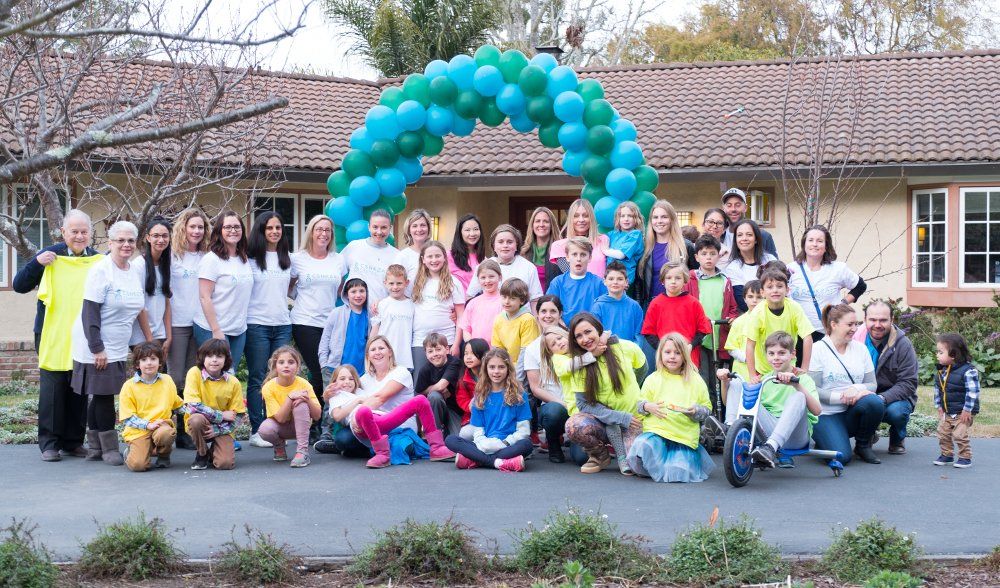My Reflection of Rare Disease Day 2018 – CSNK2A1 Foundation

EVERY DAY I HOPE YOU FEEL LOVED, SEEN, ACCEPTED AND PART OF A COMMUNITY.
This was the first time our family, together with our community, celebrated Rare Disease Day . We celebrated in honor of our daughter, Juliet, who has Okur-Chung Neurodevelopmental Syndrome (“OCNDS”), an ultra rare genetic disorder. This celebration documented our huge shift as a family to how we approach our sweet Jules’ rare genetic disorder.
I remember when Jules was 18 months old and we were seeking answers. My husband and I were devastated by her initial diagnosis of being on the autism spectrum. The realization that our child was different and her road in life would be filled with many speed bumps and unexpected detours was heartbreaking. Being a first time parent was overwhelming enough without incorporating a team of specialists and a new scientific lexicon into our lives.
As I reflect back on the early years, I think about the tears and the heartache. I responded to the initial diagnosis by taking charge of Jules’ early intervention team, Team Jules Rules, like a Fortune 500 CEO . At the peak, we had 16 providers working under our roof. We encouraged co-treatment, collaboration and teamwork. We held quarterly meetings with detailed agendas and reports. Some days I felt so overwhelmed with managingTeam Jules Rules, I could barely breathe. During those times, I never imagined we would be throwing a party tocelebrate a rare genetic syndrome. Times have changed and science has caught up with Jules. Whole Exome Sequencing recently revealed that she has OCNDS.
Our first Rare Disease celebration wouldn’t have happened without the help of our community. For years, it was difficult for us to accept friends’ offers of support because we didn’t know what we needed or how to say yes. The first step was embracing the importance of saying yes by accepting their help in planning our first Rare Disease celebration. This event taught us that we can’t do it alone and more importantly we don’t have to . (Thank you to my tribe, you know who you are!)
Together with our community, we didn’t plan any ol’ celebration. The next morning our yard looked like the kid version of “The Hangover”. This was a celebration that would bring acceptance, awareness, community, collaboration, hope and a renewed faith in humanity.
At our Rare Disease Day celebration, our friends mentioned they didn’t know what to expect when they arrived. Would this be a sad event? They wondered if you could celebrate a “rare disease”. Our celebration gave everyone an opportunity to ask questions that they were once too shy to ask or didn’t know to ask . The celebration provided a safe space to ask about Jules’ differences. For example, why doesn’t Jules talk or why does she jargon so loud? Why does she crinkle her fingers by her face when she is smiling? Will she ever talk? Does she understand what we are saying to her? Can she read? I was able to tell them that I didn’t know the answers to all their questions. Unfortunately, the OCNDS community knows very little about the syndrome. However, we are determined to find answers. Earlier this year, we formed CSNK2A1 Foundation to fund research to unlock the mysteries of OCNDS.
Rare Disease Day was especially important for our neurotypical 7-year-old son, Jasper . Jasper loves Jules very much. He worries about her. He worries she may never talk. He frequently asks how she will live on her own as an adult. He doesn’t know how to share her differences with others. Rare Disease Day gave him an opportunity to put his worries aside and celebrate Jules as she is. He wore our foundation t-shirt, CSNK2A1 Foundation, to school. His friends and teachers asked him about it. He proudly responded that his sister has a rare genetic disorder that makes it difficult to talk*. He had such a positive day; he wants to do it again! Jasper was able to talk about his sister in away he never could before. He felt accepted and heard. That t-shirt represents hope that the foundation can find treatments to alleviate her symptoms. He has hope that being an adult can be easier for Jules and others with OCNDS.
Word spread throughout our community that we had this event. Our friends and neighbors used the event as an opportunity to ask us questions about Jules’ condition and our corresponding foundation. People don’t often know how to ask or start a conversation. Rare Disease Day opened opportunities for all of us to learn . I even received several calls from families to ask about starting her their own foundations for the rare genetic disorders that have unexpectedly become a part of their lives.
It is impossible to get Jules to smile for pictures. But, on this day, there seemed to be a huge shift for Jules. As we were taking the group photo, I whispered to her, “Everyone is here for you – to celebrate you. We all love you so much.” She hugged me tightly and smiled brightly. I never expected her smile to be caught on camera. To my surprise, in every group photo she has a huge smile. In every single picture she beams with happiness. She can’t tell me how she was feeling at that moment. But I hope she felt accepted. I hope she felt loved. I hope she felt seen. I hope she felt part of our community. This is what any mom wants for her child . Now that the party has ended and Rare Disease Day has past, the real work begins: making sure she has the opportunity to feel this way every day and not just on Rare Disease Day. But don’t worry we are already planning next year’s party.
Back to work!
